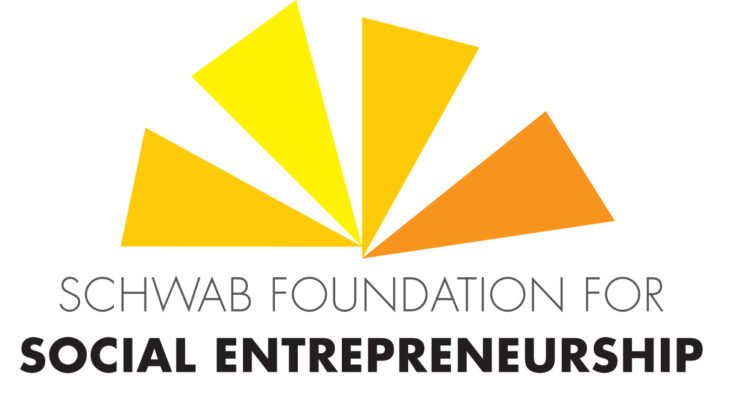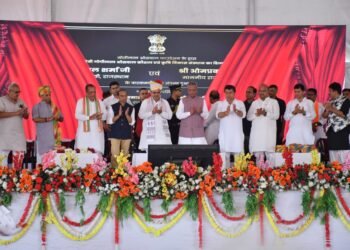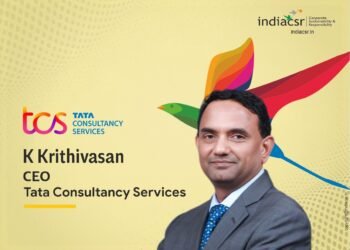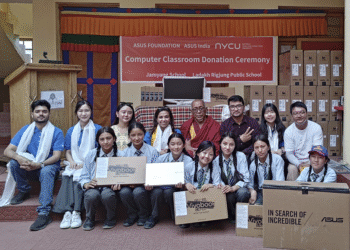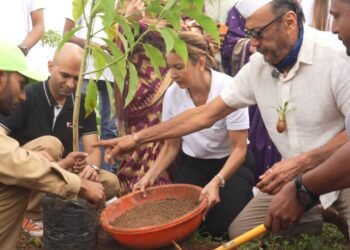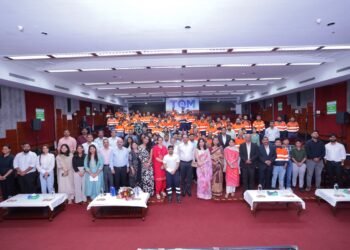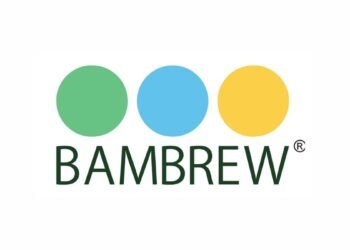The Schwab Foundation for Social Entrepreneurship, the sister organisation of the World Economic Forum and the Jubilant Bhartia Foundation, a not for profit organisation of Jubilant Bhartia Group today announced the finalists of the 11th Social Entrepreneur of the Year (SEOY) – India Award, 2020.
The winner will be chosen by a distinguished jury comprising industry stalwarts and eminent personalities from different backgrounds. The winner of SEOY India will join the Schwab Foundation for Social Entrepreneurship community, a prestigious network of social innovators from around the world.
The following accomplished social innovators have been selected as finalists for the SEOY India Award, 2020:
- Sujay Santra, iKure, Kolkata
- Sandeep Patel, NEPRA, Ahmedabad
- Ashraf Patel, Pravah & ComMutiny, New Delhi
- Madhu Pandit Dasa, The Akshaya Patra Foundation, Bengaluru
These social innovators have been selected through a rigorous process of evaluation based on various parameters, including background research, personal and on-ground team interactions, impact assessment, expert reviews and reference checks among others. The chosen finalists are tech-enabled, accomplished social entrepreneurs working in the fields of waste management, rural health, youth leadership and malnourishment in children. Their efforts are helping to bridge the gap between the marginalised and the mainstream in India. Using disruptive innovation in their respective initiatives, these innovators are bringing change through livelihood generation for rural women, improving primary health facilities, organising BoP communities of rag pickers, shaping vulnerable groups of adolescents and youth and nourishing malnourished children.
The SEOY India Award 2020 opened in March this year and received over 100 diverse applications from 23 cities including 20 applications from women social entrepreneurs. The categories of the intervention included clean technology, media communication, disability, energy, enterprise development, labour conditions, microfinance, nutrition, sustainable farming and water & sanitation.
Out of the total number of applications, health sector leads the nomination tally with (47%) applications followed by the environment (37%) education and livelihood (35%) and rural development (23%).
Now celebrating its 11th year, the SEOY India awards has established itself as one of the most reputed and coveted awards for social entrepreneurs in India. In 2010, the Schwab Foundation for Social Entrepreneurship and Jubilant Bhartia Foundation came together to promote social innovation in India through the Social Entrepreneur of the Year (SEOY) India Award. The annual award recognises entrepreneurs who implement innovative, sustainable and scalable solutions to solve India’s social problems. These entrepreneurs address pressing issues faced by under-served communities.
BRIEF DESCRIPTIONS OF THE FINALISTS:
Sujay Santra
iKure, Kolkata
With the inspirational dream of achieving zero mortality due to lack of primary healthcare in India, iKure has been working towards bringing quality, affordable, and accessible healthcare to the doorstep of communities for over a decade. iKure delivers primary healthcare, wellness & prevention services through innovative technology, trained frontline community health workers, a network of Hub & Spoke clinics with a focus on the continuum of care across rural, semi-urban as well urban settings.
Its doorstep community health workers are equipped with point-of-care (POC) devices, which enables them to provide monitoring and diagnostic support. In the geographical areas where it operates iKure offers wide-ranging health services packages, door-to-door consultation assisted telemedicine with appropriate referral and escalation, drugs and medical supplies, pathological tests, eye & dental tests, and spreads awareness among others. Through its proprietary software, Wireless Health Incident Monitoring System (WHIMS) iKure analyses patient information for health screening, early detection, and monitoring of diseases. It brings in data science and research capabilities to analyze collected data and find the root causes of ailments and addresses them holistically through a combination of health & hygiene, water & sanitation, nutrition, etc.
With its unique combination of technology intervention, skill development, and outreach initiatives iKure has served a population of over 10.2 million people in 5,200 villages across 7 states of India. With the belief in co-creation, it has created a unique ecosystem by partnering with local NGOs for on-ground mobilization, device partners for the latest technology, supply chain partners for consumables, hospitals for secondary & tertiary care and research organisations for clinical & technical knowhow of various ailments.
Sandeep Patel
NEPRA, Ahmedabad
NEPRA endeavours to solve India’s dry waste management problem through its inclusive, transparent and tech-driven socio-business model. NEPRA’s waste management services spread pan-India include Environmental compliance Advisory, collection, waste processing & recycling by creating state of the art Material Recovery Facilities. NEPRA has been demolishing the challenges faced by the Indian waste management sector one by one through its simple strategy of ‘Innovate and Improvise’, NEPRA works with the motto of ‘Zero waste to landfill’.
NEPRA engages in city-level waste management services, ranging from awareness and collection of dry waste from several big & small waste generators to sorting (according to the type of waste), processing it at its mechanized Material Recovery Facilities (MRF) and finally recycling it. The waste processed into recyclable form is traded to recyclers to churn new products and non-recyclables are channelled for energy recovery. NEPRA’s model makes the informal sector workers (waste-pickers, sweepers, and other Bottom of the Economic Pyramid members) as one of its main stakeholders. It helps in organising the unorganised waste management sector and changes the way waste is collected and dumped through the use of technology like GPS, Facial Recognition making it more efficient and transparent. Through Facial recognition, NEPRA has helped create first of its kind database of the waste pickers in the cities where it operates. It has helped curb exploitation by ensuring fair and equal payment to waste pickers, who in turn are also trained and employed at NEPRA’s MRF facilities giving them economic security.
NEPRA has so far engaged with over 2000+ waste pickers. For multi-layered packaging, NERPA has it’s tie-ups with urban local bodies and upliftment of small waste management NGOs or start-ups in 18 states in India. In last one year, NEPRA has worked with 40 local Government authorities. In the last two years, NEPRA has successfully recycled 67108.93MT of dry waste.
Ashraf Patel
Pravah & ComMutiny- The Youth Collective, New Delhi
Pravah has been facilitating the development of a generation of empathetic, sensitive youth change-makers in India through psycho-social interventions, helping them build more inclusive identities and societies bringing about revolutionary changes. With a belief that leaders are created in spaces which are safe, empowering, and inclusive, a unique approach to youth development in the form of the ‘5th Space’ has been developed. The 5th Space focuses on transforming young people by engaging them in deep self-exploration and supporting their social action experiments to become change-makers and awakened active citizens. It nurtures social inclusion, holistic development and fosters social hope by promoting feelings of freedom, ownership, love and learning and growth. With credence in its strategy and approach of creating ‘Abilities beyond skill’ Pravah has produced over 50 different designs of self to society journeys for different youth audiences ranging from urban middle-class young people to youth from rural and tribal backgrounds.
ComMutiny – The Youth Collective, was incubated by Pravah in collaboration with some of the best youth engaging organisations in the country and is a sustainable and vibrant national community of practice that nurtures 5th Spaces with and for young people, through joint programming, partnerships, capacity building and public engagement on contemporary issues focusing on youth-centric development and constitution values. A multi-sectoral formulation, called the vartaLeap coalition is also emerging from this eco-system to realise the mission of ‘Every Youth a Jagrik and Every Space Nurturing Jagriks’, that places youth duties and rights at the centre of all programming and policies in relation to youth and spaces that engage and influence young people in the country.
Together Pravah and ComMutiny- The Youth Collective (CYC) have nurtured 6,80,000 young leaders, worked with over 1200 youth-centric organisations and 100 civil society groups across 17 states in the country. The organisations have nurtured and empowered spaces with and for young people, through joint collaborative programming and partnerships; capacity building of people and organisations and engaging with multiple stakeholders in the adolescent and youth space.
Madhu Pandit Dasa
The Akshaya Patra Foundation, Bengaluru
Driven by the vision that ‘No child in India shall be deprived of education because of hunger,’ The Akshaya Patra Foundation has harnessed the might of Public-Private Partnership (PPP) model to address a social cause on a massive scale, feeding more than 1.8 million schoolchildren every day. Focused on solving the issues of classroom hunger and declining enrolment rates, Akshaya Patra zeroes-in on school-going children in Government and Government-aided schools, with the singular impetus to break the cycle of undernourishment and enable a future generation that is nourished and educationally equipped.
In its capacity as the implementing partner of the Government of India’s flagship school feeding program, the Mid-Day Meal (MDM) Scheme, the organisation attempts to feed the millions of children who lack the means, but, have the zeal to learn and achieve. Akshaya Patra’s network of centralised kitchens is a validation of its belief in technological innovation for effective and efficient implementation of welfare programs. Akshaya Patra’s centralised, semi-automated kitchens can undertake large scale feeding, up to 100,000 meals a day whilst ensuring safe handling, preparation, and delivery of the food. They also ensure strict adherence to recipes through automated systems to consistently maintain taste and quality.
The Foundation reaches out to over 1.8 million children in the age group of 6-14 years with nutritious, hygienic, safe and tasty mid-day meals every day. In addition, it serves more than 1.4 lakh beneficiaries through the Integrated Child Development Services (ICDS) Anganwadi feeding initiative. These include pregnant women, nursing mothers, and children up to 6 years of age. It operates in 51 locations across 12 states and two union territories across India through its network of centralised and decentralised kitchens.

